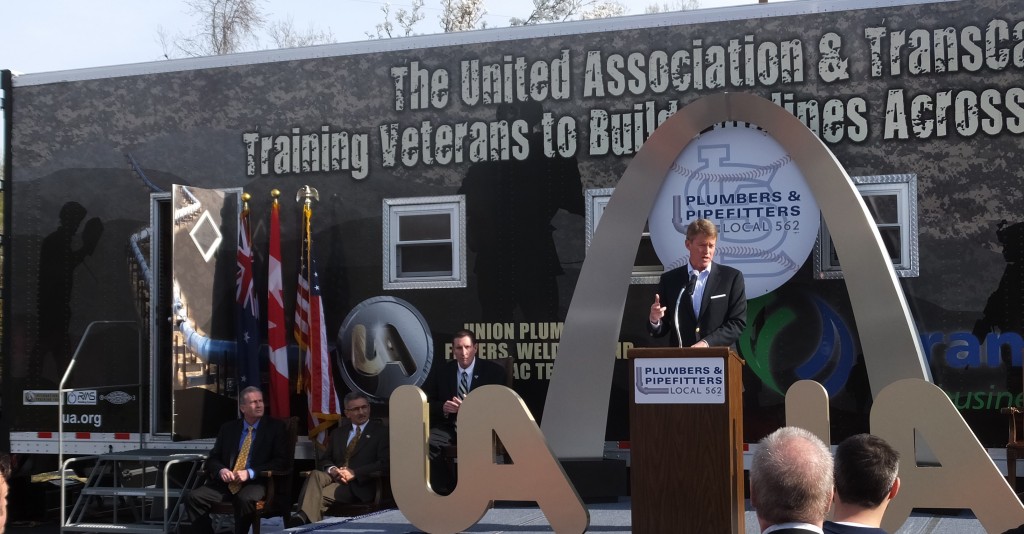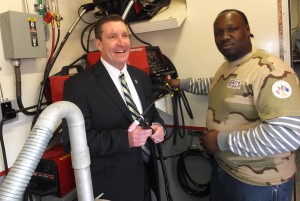
– Labor Tribune photo
Nationwide – The Veterans In Piping (VIP) Program, a unique, nationwide effort by the United Association of Plumbers & Pipefitters (UA) to help returning veterans obtain job skills, and help journeymen upgrade the skills needed for specific jobs, was on unveiled at Plumbers & Pipefitters Local 562’s training facilities in St. Louis as part of a special event to highlight the training program and push for approval and final construction of the Keystone XL Pipeline from Canada to the Gulf Coast.
The event was co-hosted by Local 562 and TransCanada, the Canadian pipeline company behind the Keystone XL.
Local 562 Business Manager John O’Mara said the UA and Local 56 were proud of their role providing quality skills training so local contractors have the skilled workforce they need to provide quality service to their customers.
The VIP Program involves 30 mobile training units (trailers) provided by the UA to its locals, enabling the locals to provide 18-20 weeks of training anywhere in the U.S. and Canada – even on job sites.
The individually designated trailers are equipped to provide specific skills training for welders, plumbers, sprinkler fitters, and other skills of the trade.
The one on display at the event was for providing training on welding large bore pipes like those used in the Keystone XL.
Through theVIP Program, an outgrowth of the Building Trades Helmets to Hardhats efforts, the US takes the trailers onto military bases to offer free skills training to service men and women about to complete their tours of duty and return to civilian life.
‘TRAINING FOR AMERICA’S HEROES’

– Labor Tribune photo
Missouri Attorney General Chris Koster, a Democratic candidate for governor in 2016, provided the keynote address for the event.
Koster complimented the UA for its foresight in creating the VIP Program to help train returning vets with the skills to create a family-supporting career.
“Every day 1,000 service members return home, while only 100 obtain full-time employment. In Missouri, there are 4,000 post 9/11 vets looking for work,” he said, adding, “Any veteran struggling to find a steady job after serving our country is one too many.”
Koster said the Keystone XL pipeline would boost demand for skilled labor and offer good jobs “at an honest day’s pay.”
“I applaud the UA and TransCanada for investing in workforce training for American’s heroes because every returning service member deserves a chance to achieve the American dreams they’ve fought so hard to preserve.”

Pat Kellett, UA administrative assistant to the general president and former Local 562 business manager, said “Projects like Keystone will help us expand our VIP program and help more veterans rebuild their lives after their service to our nation. Keystone will not only mean jobs for Americans, it will mean energy security for our future.”
Responding to pipeline critics, Kellett stressed that the pipeline, “built by American workers, will be the safest and most efficient pipeline ever built.”
Many pipelines currently crisscrossing America are 60 years old and in need of updating, Kellett said. “If we want to seriously address climate change and create good jobs, we should upgrade our nation’s outdated pipeline network and create more jobs like Keystone.”
42,000 NEW JOBS

Les Cherwenuk, director, Keystone Pipeline Development & Construction for TransCanada, provided some solid economic facts about the Keystone XL:
• It will create 42,000 new jobs, 16,000 of which will be construction jobs and manufacturing jobs to produce the foods and services for the pipeline.
• The remaining 26,000 jobs will be those created by the monies spent to build the pipeline.
“Some 9,000 jobs were created when the pipeline was built through Missouri in 2010, resulting in over $9 million in property taxes being paid to the state, now and forever,” Cherwenuk said.
“The Keystone pipeline is in America’s national interest and TransCanada stands behind it. We are proud of what it will mean to America’s energy security and the training and jobs our company is providing to veterans as a result of it, he said.
VIP VET
O’Mara said the program gives back to veterans who have given so much for the safety of our nation. They work hard, he said, and when they’ve completed the program, go into a local union’s apprenticeship program “to become a real asset to their communities.”
Markus Collier, an eight-year Army vet who served in Iraq and went through the VIP training, said when he was discharged, he didn’t know how he was going to support his family.
“The VIP effort gave me a career and the ability to earn a living,” he said.
Collier is now a first-year apprentice in Local 562’s program.

